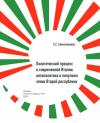Six Criteria for Military Intervention: Last Resort
Вход
Авторизуйтесь, если вы уже зарегистрированы
In my previous blog entry I talked about the politicized and selective approaches of UN Member States to making decision on intervention into intra-state conflicts. So, what could be the solution to this problem? What is needed to minimize the politicization? Clear criteria for military intervention should be defined in international law, so that when an intra-state conflict erupts, the international community, having timely assessed the conflict on the ground, could run through a checklist of those criteria for military intervention and make a collective decision on whether it is justified and necessary. In this and my following blog entries I will try to go through these criteria.
In 2001 the International Commission for Intervention and State Sovereignty released a report addressing the criteria for military interventions, stating that “the relevant decision making criteria can be succinctly summarized under the following six headings: last resort, just cause, right intention, reasonable prospects and proportional means, right authority.”
These proposed recommendations didn’t result in international law. Nevertheless, a scrutinization of them in light of lessons learnt from recent conflicts might serve as a foundation for forming and adopting criteria for making decisions on military interventions.
Thus, according to such a checklist, military intervention would be permissible if:
- other peaceful means are inadequate (Last resort)
- there is a strong cause for intervention (Just cause)
- the international community has humanitarian purposes as the primary motivation for intervention (Right intention)
- the international community can supply adequate means and the intervention will bring more good than harm (Proportional means and reasonable prospect)
- the military intervention is authorized by the UN Security Council (Right authority)
Criterion 1: Last resort
The end goal of any conflict, including a military one, is to find a negotiated solution. Yet before military intervention is considered as an option we must first be sure that a negotiated solution cannot be achieved through peaceful means.
While bearing in mind that military intervention should be the last resort, the time spent trying to achieve a negotiated solution through peaceful means often comes at a cost of more victims and suffering. Thus we should assess upfront if peaceful means will have a chance of success in order to avoid wasting too much time stagnating on approaches that are unlikely to succeed.

For example in Syria, for almost two years now the international community has tried unsuccessfully to rely upon peaceful means such as six-point Annan’s plan, the UN observer mission, a GA resolution, and presidential statements to condemn the violence, but these still have not been able to halt the protracted massacre. The civilian casualty count in Syria continues to rise with each passing day.
While in Libya, military intervention occurred just two weeks after having instated non-military means through the unanimously adopted resolution 1970, which wasn’t able to end the mass violence in that time. This decisive action, in an attempt to prevent Gaddafi’s threat of attacking the population in Benghazi, potentially averted massive casualties as peaceful means wouldn’t likely have been effective.
Thus, governments should understand the viability of each option of forming a response to intra-state conflict in order to avoid spending too much time on diplomatic means when the conflict might only be resolved with military intervention.




